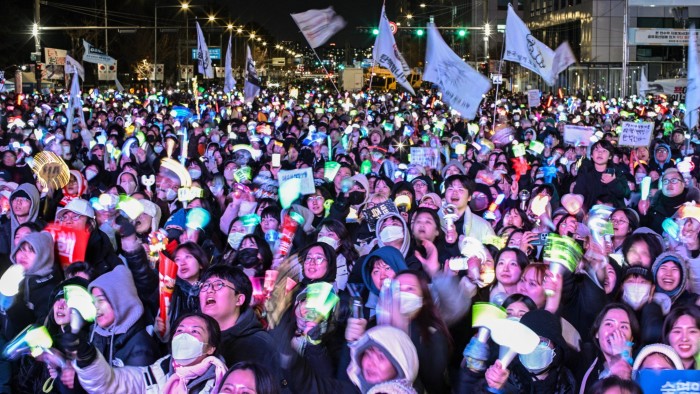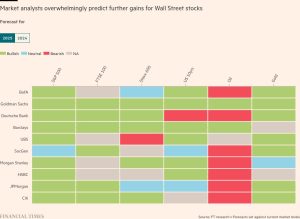Economic unfairness threatens to undermine democracy in South Korea

Unlock the Editor’s Digest for free
Roula Khalaf, Editor of the FT, selects her favourite stories in this weekly newsletter.
The writer is a professor of economics at Soas, University of London. His latest book is ‘Edible Economics’
They’ve done it again. South Korean citizens have put pressure on parliamentarians to impeach a president by taking to the streets in millions — as they did back in 2016.
Even though the impeachment is yet to be confirmed by the constitutional court, the case is far more clear-cut. The scandals surrounding President Yoon Suk Yeol are arguably much more egregious than those involving former president Park Geun-hye, who was impeached in 2016 after allegations of influence-peddling and the leaking of classified information. More importantly, by declaring martial law for the first time in 44 years, the act that sparked off the impeachment process, Yoon sought to undermine the constitutional order through violence, which Park did not.
Yoon’s rapid demise is a tribute to the robustness of Korean democracy, which has been forged through decades of struggle against dictatorship and military rule. When Yoon declared martial law, opposition politicians and millions of citizens acted promptly and decisively to reject the move and impeach the president.
But if Korean democracy is so robust, why are mass protests and presidential impeachments so frequent? It is because Korean democracy has failed to deliver for ordinary citizens.
Korea’s transition to democracy started in 1987, when the military was ousted after 26 years. The election of Kim Dae-jung, the leading pro-democracy activist, as president in 1997 completed the process of democratisation. Kim’s election was to open an era of economic fairness, as well as political freedom.
Unfortunately, Kim’s election coincided with the 1997 Asian financial crisis, which compelled Korea to agree a radical programme of economic liberalisation with the IMF. Greater fairness was off the agenda. Subsequent governments all adhered to the liberal economic agenda.
The result has been three decades of significantly slower growth, fewer quality jobs, increased inequality and vastly reduced social mobility, compared with the “miracle” years between 1961 and 1996. Economic insecurity was heightened by the failure of the welfare state to grow. Today, public social spending in Korea is below 15 per cent of GDP, among the lowest in the OECD.
All this has created a sense of hopelessness and pessimism about the future, manifested in the world’s lowest birth rate and the highest suicide rate in the OECD. Life is hard, particularly for the over-65s, who suffer from the OECD’s highest old-age poverty rate.
This sense of disaffection, which pervades groups across society, has left people vulnerable to rightwing demagogues such as Yoon.
Back in 2022, Yoon was elected to the presidency partly thanks to his success in mobilising men in their twenties and thirties, who were told that their inability to move up the social ladder was due to overly competitive women, rather than to failures of policy.
Another group loyal to Yoon are the elderly. Many look back on the days of military dictatorship, when life was even harder but nonetheless offered hope, with nostalgia. They were taught during the cold war to reject the notion of a welfare state as a “communist” idea — never mind that it dates back to the 19th century and to Prussia’s “Iron chancellor” Otto von Bismarck, who saw it as a way of warding off socialism.
The biggest negative legacy of cold war politics, however, is the absence of an alternative on the left of the political spectrum. The main opposition grouping, the Democratic party, often described as “progressive” and even accused of being “pro-communist” by Yoon, is in fact ideologically to the right of most European centre-right parties. The party’s failure while in office to implement policies to reduce inequality and increase social mobility is what helped Yoon’s party rise from the ashes of Park’s impeachment.
The next Korean government, which is likely to be formed by the Democratic party, has to break out of the shackles of cold war politics and implement more egalitarian policies, including the expansion of the welfare state, the extension of worker rights and radical reform of the education system. Otherwise, Korea will fall back into the familiar cycle of popular democratic activism deposing a conservative government, only for the latter to return because of the inability of a “progressive” administration to deliver.
#Economic #unfairness #threatens #undermine #democracy #South #Korea




